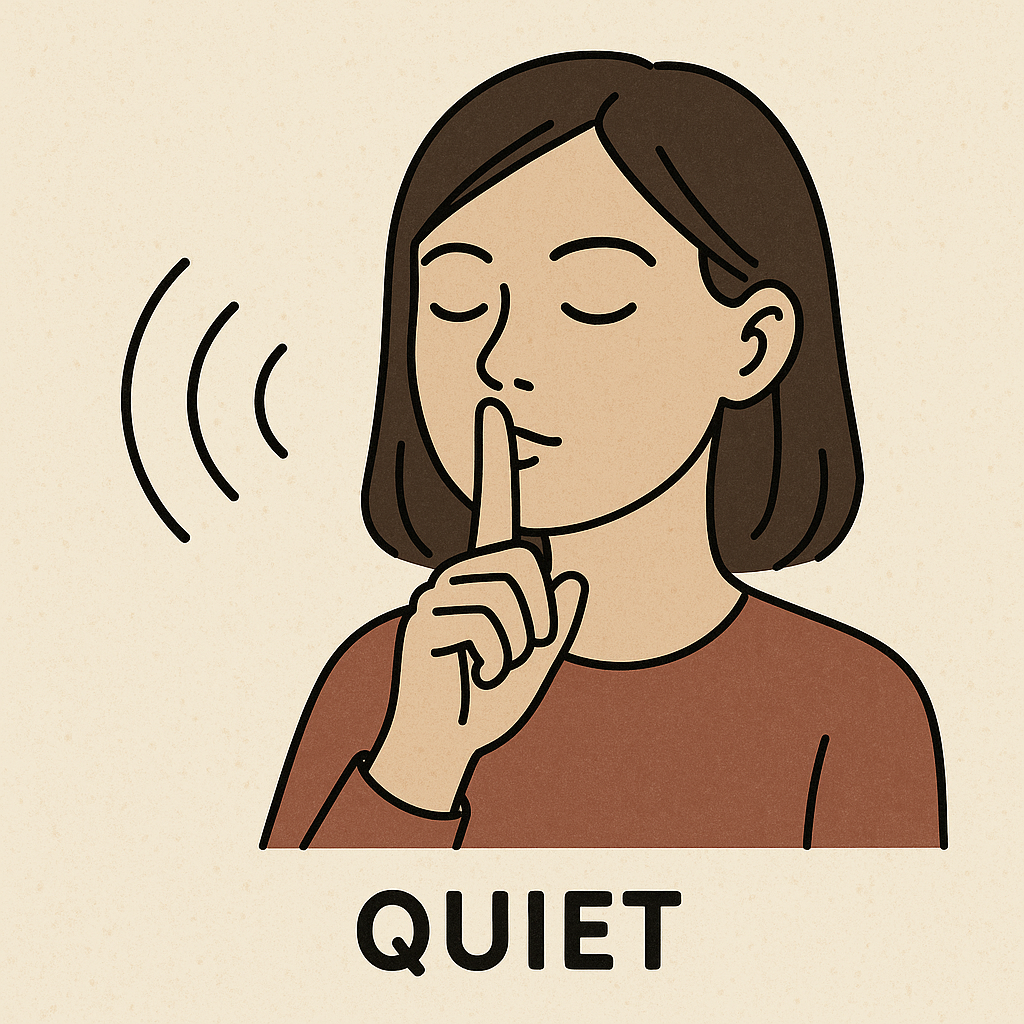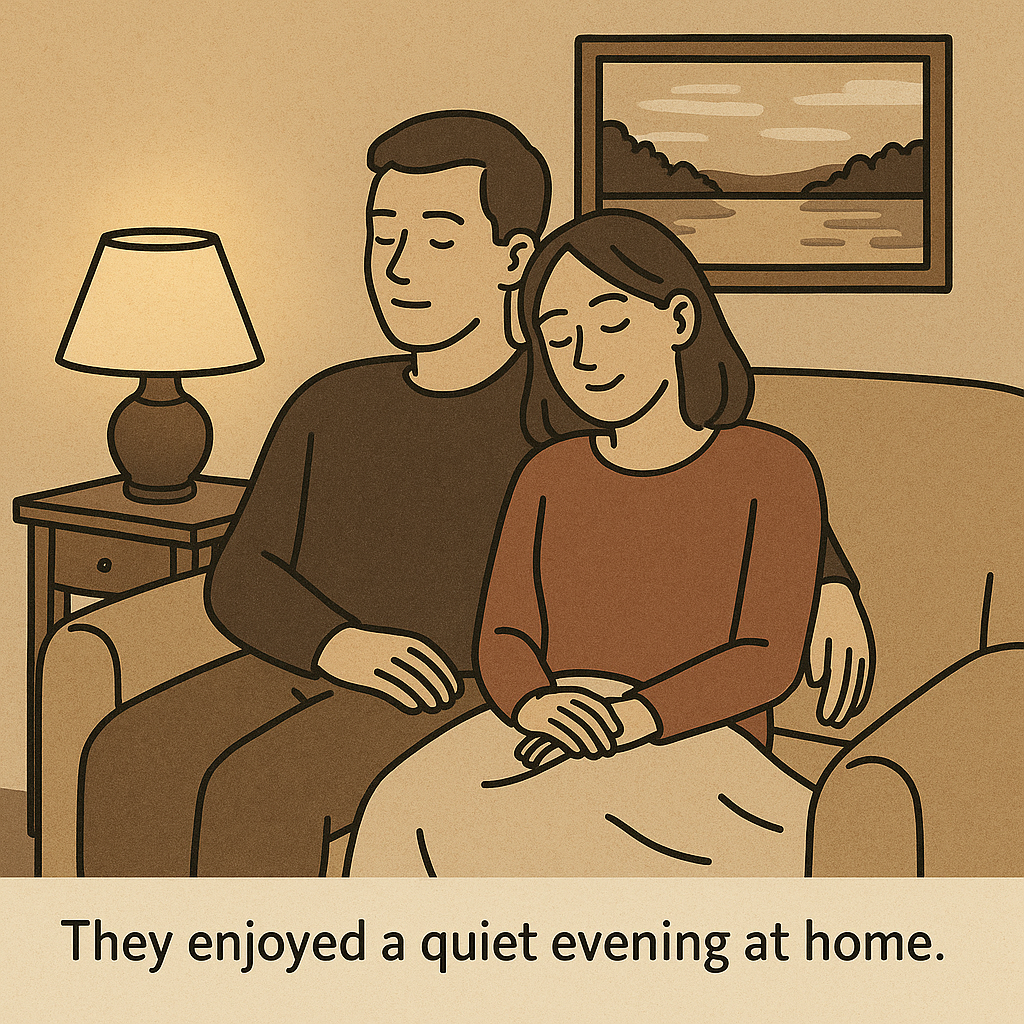Quiet
Definition
The term "quiet" describes a state of silence, calmness, or absence of noise, or the act of making someone or something silent.
Parts of Speech
- Adjective
- Noun
- Verb
Pronunciation
American English
- IPA Pronunciation: /ˈkwaɪ.ət/
- Respelling: KWY-uht
British English
- IPA Pronunciation: /ˈkwaɪ.ət/
- Respelling: KWY-uht
Etymology
The word "quiet" originates from the Latin "quietus," meaning "calm" or "at rest," derived from "quies" (rest or peace). It entered Middle English via Old French "quiet."
Derivatives
- Quietly (adverb)
- Quietness (noun)
- Quieten (verb)
- Quietude (noun)
- Quietism (noun)
Synonyms
- Silent
- Calm
- Tranquil
Antonyms
- Loud
- Noisy
- Chaotic
Usage
The term "quiet" is commonly used in contexts such as personal behavior, environmental settings, or commands. For example, "The library is a quiet place to study" or "Please quiet the dog."
Related Terms
- Silence: Complete absence of sound.
- Serenity: The state of being calm or peaceful.
- Tranquility: A state of peace and calmness.
Detailed Definitions
Adjective
- Making little or no noise: Refers to a sound level that is low or absent.
- Example: "The house was so quiet you could hear the clock ticking."
- Free from disturbance or chaos: Refers to a calm or peaceful state.
- Example: "They enjoyed a quiet evening at home."
Noun
- A state of silence or calm: Refers to the absence of noise or chaos.
- Example: "The quiet of the forest was soothing."
Verb
- To make someone or something silent or calm: Refers to the act of reducing noise or agitation.
- Example: "She tried to quiet the crying baby."
quiet



🇨🇳 Mandarin
- 安静 (Ānjìng) - quiet (as an adjective)
- IPA: /an tɕing/
- Respell: an jing
- 静 (Jìng) - quiet (as a verb)
- IPA: /tɕing/
- Respell: jing
🇮🇳 Hindi
- शांत (Shānt) - quiet (as an adjective)
- IPA: /ʃɑːnt/
- Respell: shant
- चुप (Chup) - quiet (as a verb)
- IPA: /tʃʊp/
- Respell: chup
🇪🇸 Spanish
- Tranquilo - quiet (as an adjective)
- IPA: /tranˈkilo/
- Respell: tran-kilo
- Silencio - quiet (as a noun)
- IPA: /siˈlensjo/
- Respell: si-lens-yo
🇫🇷 French
- Tranquille - quiet (as an adjective)
- IPA: /tʁɑ̃.kil/
- Respell: tran-kil
- Silencieux - quiet (as a noun)
- IPA: /si.lɑ̃.sjø/
- Respell: si-lan-syuh
🇸🇦 Modern Standard Arabic
- هادئ (Hādi’) - quiet (as an adjective)
- IPA: /haːdiːʔ/
- Respell: ha-dee
- سكون (Sukūn) - quiet (as a noun)
- IPA: /suːkuːn/
- Respell: soo-koon
🇧🇩 Bengali
- শান্ত (Shānt) - quiet (as an adjective)
- IPA: /ʃɑnto/
- Respell: shan-to
- নিঃশব্দ (Niśśabda) - quiet (as a noun)
- IPA: /niʃʃobdo/
- Respell: nish-shob-do
🇷🇺 Russian
- Тихий (Tikhiy) - quiet (as an adjective)
- IPA: /ˈtʲixʲɪj/
- Respell: ti-khiy
- Тишина (Tishina) - quiet (as a noun)
- IPA: /tʲɪˈʂinə/
- Respell: ti-shi-na
🇵🇹 Portuguese
- Tranquilo - quiet (as an adjective)
- IPA: /tɾɐ̃ˈkilu/
- Respell: tran-kilu
- Silêncio - quiet (as a noun)
- IPA: /siˈlẽsiu/
- Respell: si-len-siu
🇮🇩 Indonesian
- Tenang - quiet (as an adjective)
- IPA: /tənaŋ/
- Respell: te-nang
- Diam - quiet (as a verb)
- IPA: /diam/
- Respell: di-am
🇩🇪 German
- Ruhig - quiet (as an adjective)
- IPA: /ˈʁuːɪç/
- Respell: ruh-ich
- Stille - quiet (as a noun)
- IPA: /ˈʃtɪlə/
- Respell: stil-le
🇯🇵 Japanese
- 静か (Shizuka) - quiet (as an adjective)
- IPA: /ɕizɯ̥ka/
- Respell: shi-zu-ka
- 静まる (Shizumaru) - quiet (as a verb)
- IPA: /ɕizɯ̥marɯ̥/
- Respell: shi-zu-ma-ru
🇻🇳 Vietnamese
- Yên lặng - quiet (as an adjective)
- IPA: /jəːn˧ˀ˨ʔ laəŋ˧ˀ˨ʔ/
- Respell: yen lang
- Im lặng - quiet (as a noun)
- IPA: /im˧ˀ˨ʔ laəŋ˧ˀ˨ʔ/
- Respell: im lang
🇰🇷 Korean
- 조용한 (Joyonghan) - quiet (as an adjective)
- IPA: /dʑojoŋhan/
- Respell: jo-yong-han
- 조용히 (Joyonghi) - quiet (as an adverb)
- IPA: /dʑojoŋhi/
- Respell: jo-yong-hi
🇹🇷 Turkish
- Sessiz - quiet (as an adjective)
- IPA: /ˈsesiz/
- Respell: ses-siz
- Sükûnet - quiet (as a noun)
- IPA: /sykunet/
- Respell: su-ku-net
🇵🇰 Urdu
- خاموش (Khamosh) - quiet (as an adjective)
- IPA: /xɑːmoʃ/
- Respell: kha-mosh
- سکون (Sukoon) - quiet (as a noun)
- IPA: /sʊkuːn/
- Respell: su-koon





